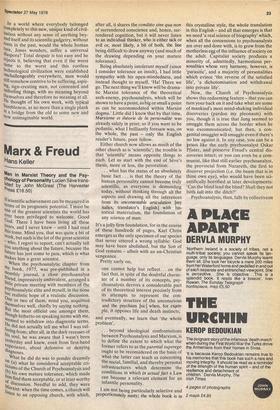Marx & Freud
Hans Keller
Man In Marxist Theory and the Psychology of Personality Lucien Save transLated by John McGreal (The Harvester Fress £16.50) if scientific achievement can be measured in terms of its prognostic potential, I must be one of the greatest scientists the world has ever been privileged to welcome. Good God. There I have been living all these Years, and I never knew — until I had read this tome. Mind you, that was quite a bit of Work, but such is the lot of the great scientist " Who, I regret to report, can't actually tell You anything about the future, because the future has just come to pass, which is what makes him a great scientist. When the psychoanalytic chapter from ttlY book, 1975, was pre-published in a tn.onthly journal, a close psychoanalyst f,rlend, impressively ambivalent, arranged a Ittle private meeting with members of the PsYchoanalytic elite and myself, in the none too realistic hope of a realistic discussion. °Ile or two of them, mind you, acquitted tilleMselves well, chiefly by saying nothing. lit the most official one amongst them, though hitherto on speaking terms with me, riented to withdraw into diagnostic terms. f e. did not actually tell me what I was sufhe,ring from; after all, in the dark recesses of 'ts soul, he was aware that I wasn't born Yesterday and knew, even from first-hand Perience, about defensive or denying oiagnoses. What he did do was to ponder dreamily what he considered acceptable cri`1,eisms of the Church of Psychoanalysis and 1(3?) his own mature tolerance, which made 141 find them acceptable, or at least worthy f°r1 discussion. Needful to add, they were 1. atxist: when the time comes, a church will 'sten to an opposing church, with which, after all, it shares the conditio sine qua non of surrendered conscience and, hence, surrendered cognition, but it will never listen to an individual thinker, who is either sick or evil or, most likely, a bit of both, the line being difficult to draw anyway (and much of the drawing depending on your mature tolerance).
Being absolutely intolerant myself (since I consider tolerance an insult), I had little sympathy with his open-mindedness, and instead thought to myself, 'Ha! There we go. The next thing we'll know will be dramatic Marxist tolerance of the theoretical arch-enemy, psychoanalysis, which will be shown to have a point, as big or small a point as can be accommodated within Marxist dogma.' Little did I know that by that time, Marxisme et theorie de la personalite was already safely in print; so if you want to be pedantic, what I brilliantly foresaw was, on the whole, the past — only the English reader's future, poor fellow.
Either church now allows as much of the other church as is 'scientific'; the trouble is that 'scientific' means opposite things to each. Let us start with the end of Seve's thesis, more or less, the peroration:
. . . what has the status of an absolutely basic fact. . . is that the theory of the human personality cannot become truly scientific, as everyone is demanding today, without thinking through all the aspects and drawing all the inferences from its uncontestable articulation [my italics, translator's English] with historical materialism, the foundation of any science of man.
It's a jolly firm foundation, for in the course of these hundreds of pages, Karl Christ emerges as the only specimen of our species that never uttered a wrong syllable: God may have been abolished, but the Son of God remains — albeit with an un-Christian vengeance.
Pretty early on, one cannot help but reflect. . . on the fact that, in spite of the doubtful character of a number of its concepts, psychoanalysis derives a considerable part of its theoretical interest precisely from its attempts to represent the contradictory structure of the unconscious and the psychism [sic] when, for example, it opposes life and death instincts; and eventually, we learn that 'the whole problem',
. . . beyond ideological confrontations between Psychoanalysis and Marxism, is to define the extent to which what the former refers to as the parental superego ought to be reconsidered on the basis of what the latter can teach us concerning the social, familial, and thereby personal infrastructures which determine the conditions in which in actual fact a Law can become a relevant element for an infantile personality.
I am not being particularly selective and proportionately nasty; the whole book is in this crystalline style, the whole translation in this English — and all that emerges is that we need 'a real science of biography' which, when all the concessions to psychoanalysis are over and done with, is to grow from the motherless egg of the influence of society on the adult. Capitalist society produces a minority of, admittedly, harmonious personalities whose very harmony, however, is 'parasitic', and a majority of personalities which evince 'the reverse of the satisfied life', 'a dichotomisation and withdrawal into private life'.
Now, the Church of Psychoanalysis shows this redeeming feature — that you can turn your back on it and take what are some of mankind's most mind-shaking individual discoveries (pardon my pleonasm) with you, though it is true that Jung seemed to smuggle them across the border when he was excommunicated; but then, a congenital smuggler will smuggle even if there's no law against it. In any case, you can be a priest like the early psychoanalyst Oskar Pfister, and preserve Freud's central discoveries intact; or you can even be a communist, like that still earlier psychoanalyst, the provincial from Nazareth, the first to discover projection (i.e. the beam that is in thine own eye), who would have been scientifically horrified at later developments: 'Can the blind lead the blind? Shall they not both fall into the ditch?'
Psychoanalysis, then, falls by collectivism


































 Previous page
Previous page